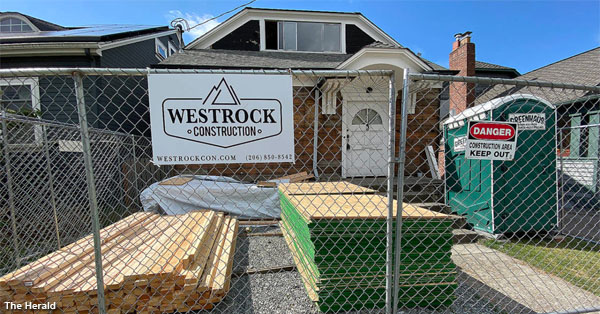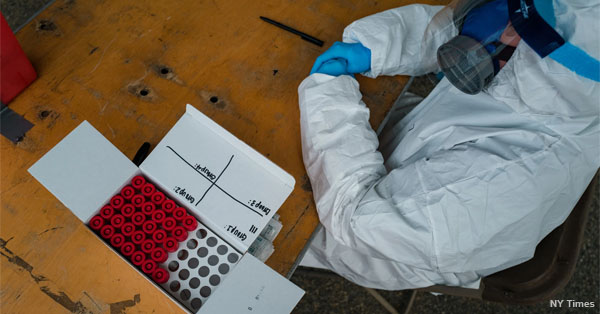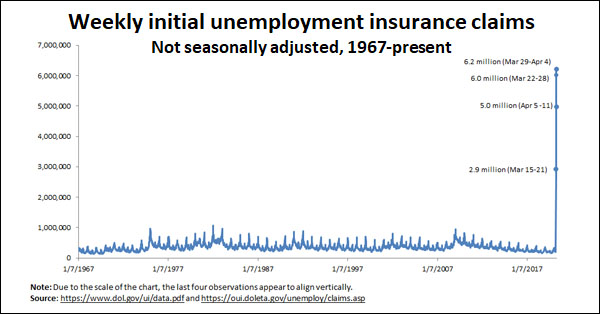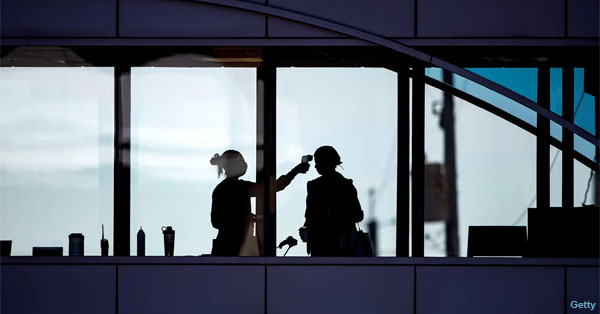NEWS ROUNDUP
Big Boeing cuts loom ● Wallula’s hot spot ● OSHA is MIA
Thursday, April 16, 2020
THIS WASHINGTON
► LIVE from the Seattle Times — Coronavirus daily news update, April 16 — The most recent count of COVID-19 cases in Washington totals 10,783 infections and 567 deaths, according to the state Department of Health.
► In the (Everett) Herald — Inslee: We are not close, yet, to lifting restrictions — Gov. Jay Inslee on Wednesday spelled out conditions for bringing the state economy back online, as six statewide labor and business organizations presented him a detailed approach for one of the hardest hit sectors, the construction industry.
► From The Olympian — Builders urge Inslee to allow construction to resume with precautions for COVID-19 — “I’ve talked to any number of construction workers who don’t want to go on the job, get infected, and go home and infect their families,” Inslee has said. But on Wednesday, the governor suggested may be an opportunity to resume commercial and residential construction before May 4 or shortly after.
ALSO at The Stand — Labor, business outline plan for limited restart of construction
► In the Olympian — Number of Monroe inmates testing positive for coronavirus up to 10 — As the number of inmates testing positive for COVID-19 reached 10 on Wednesday at the Monroe Correctional Complex, Gov. Jay Inslee signed an emergency proclamation that enables the state to more quickly release inmates to free up space for social distancing.
► In the Seattle Times — To speed gig workers’ unemployment claims, state asks companies for tightly held income data — The state Employment Security Department wants companies like Uber and Lyft, which rely on gig workers, to provide data on wages and hours worked to more quickly provide workers with unemployment assistance. But it’s not clear whether companies will comply with the request for data, and state officials say not getting it could further delay unemployment benefits to a broad category of workers hit hard by the COVID-19 crisis.
► In the (Everett) Herald — Two Democrats enter race for Jared Mead’s state House seat — Anne Anderson and April Berg revved up campaigns this week. Republican Mark James was already in the running.
BOEING
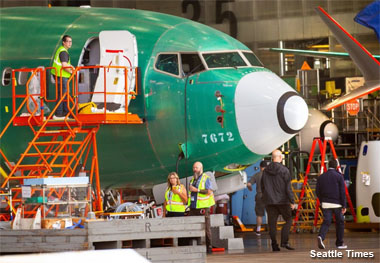 ► In the Seattle Times — Coronavirus compounds Boeing’s crisis, pointing to sharp job cuts and slashed production — Following the grounding of the best-selling 737 MAX that has severely strained Boeing’s resources for 13 months, the coronavirus pandemic has now grounded most of the rest of the global commercial jet fleet. As Boeing’s leadership reckons with the new reality that right now few airlines can take the planes they have on order, it will soon be forced to slash planned production rates — a prospect that could bring steep job losses. If a recovery to former levels of air travel stretches into years, as some experts project, the collapse in the company’s business could rival the three years after the 9/11 terrorist attacks, when management cut production almost in half and 27,000 Boeing jobs in this state melted away. A former senior Boeing leader, who asked for anonymity to speak freely about the situation, said that to conserve cash and stay in business, production cuts could again go that deep.
► In the Seattle Times — Coronavirus compounds Boeing’s crisis, pointing to sharp job cuts and slashed production — Following the grounding of the best-selling 737 MAX that has severely strained Boeing’s resources for 13 months, the coronavirus pandemic has now grounded most of the rest of the global commercial jet fleet. As Boeing’s leadership reckons with the new reality that right now few airlines can take the planes they have on order, it will soon be forced to slash planned production rates — a prospect that could bring steep job losses. If a recovery to former levels of air travel stretches into years, as some experts project, the collapse in the company’s business could rival the three years after the 9/11 terrorist attacks, when management cut production almost in half and 27,000 Boeing jobs in this state melted away. A former senior Boeing leader, who asked for anonymity to speak freely about the situation, said that to conserve cash and stay in business, production cuts could again go that deep.
LOCAL
► In the Spokesman-Review — Eastern Washington meat plant sees cluster of 47 virus cases, remains open — As of Wednesday, a total of 47 cases have been traced to the Tyson Fresh Meats processing facility in Wallula, which employs about 1,400 people. County health officials have not asked the plant to shut down. If all the workers are laid off, health officials say, they will still be in the community and could expose others whenever they leave home.
EDITOR’S NOTE — So… 1) That’s already happening anyway when workers leave work every day, and 2) They continue working “elbow to elbow” with each other as long as they don’t have temperatures when we’ve known for months that the virus is spread long before infected people show symptoms. This is a recipe for this…
► In the Argus Leader — Smithfield Foods now largest coronavirus hot spot in US; CDC in Sioux Falls to investigate — The 518 employees and 126 non-employees connected to Smithfield Foods plant in Sioux Falls, SD, makes it the largest cluster in the country. Smithfield announced on Sunday that it would be closing its Sioux Falls plant indefinitely on Wednesday. The plant has 3,700 employees.
► From The Hill — Smithfield plant worker dies from coronavirus
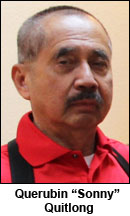 ► From UFCW 21 — Remembering Sonny — We are sorry to announce the passing of UFCW 21 member Querubin “Sonny” Quitlong, who worked as a checker at Safeway on Rainier Avenue in Seattle and passed away recently from complications of COVID-19.
► From UFCW 21 — Remembering Sonny — We are sorry to announce the passing of UFCW 21 member Querubin “Sonny” Quitlong, who worked as a checker at Safeway on Rainier Avenue in Seattle and passed away recently from complications of COVID-19.
► From KNKX — Waste haulers deemed ‘essential’ but denied access to bathrooms, COVID-19 tests — The increase in residential waste is something Tiffany “TJ” Berger has experienced up close. She drives a recycling truck for Waste Management in Seattle. Berger is one of just two women out of 177 drivers for Teamsters Locals 117 and 174, who report for work at the Waste Management jobsite in Seattle. She empties recycling bins from dozens of downtown businesses every day, during a shift that starts at 3 a.m. It’s physically demanding work, which is normally no problem for her. But Berger is more easily exhausted now. She and her partner got COVID-19 from their roommate.
► From the AP — Reopening could require thousands more public health workers — Before Washington state lifts its stay-at-home order, public health workers in King County want to be ready to douse any new sparks of infection. That task, they say, requires at least 20 more investigators to call people who test positive for the coronavirus, track down their contacts and get them into quarantine. Without the extra help, the workers insist, the state can’t possibly be ready to resume normal everyday activities. The challenge extends well beyond Seattle.
► In the Wenatchee World — Confluence Health implements salary reductions for some staff — Confluence Health announced Wednesday it will move forward with salary reductions for just over 600 employees to offset lost revenue from postponed elective patient care. The affected employees represent around 14.7 % of Confluence Health’s 4,200-employee workforce.
► In the News Tribune — Container traffic at ports of Seattle and Tacoma drops amid coronavirus, trade trouble — The Northwest Seaport Alliance said that March container volumes fell about 22 percent from volume totals the same time last year. The drop in volumes was not solely blamed on COVID-19. The U.S.-China tariff battle already was having an impact in trade volumes at the start of the year before the local emergence of the outbreak.
► In the NW Labor Press — Lessons in a time of crisis (by Oregon AFL-CIO President Graham Trainor) — The coronavirus pandemic has exposed the gaps and the cracks in our social safety net and employment laws. It has started to shift society’s perspective on the value and dignity of work, and has validated so much of what the labor movement has said for years: Our rigged economic system doesn’t work for most of us.
NON-VIRAL NEWS
► From the NW Labor Press — ICTSI refuses to accept $19 million from ILWU and will seek new trial — Philippine multinational ICTSI said March 20 it won’t accept a judge’s ruling that ILWU must pay it $19.1 million in economic damages, arguing that’s too small. In November, a jury directed ILWU to pay $93.6 million to ICTSI for the economic harm caused by a sustained dockworker slowdown at Port of Portland Terminal 6. But on March 5, the federal judge ruled that $19.1 million was the maximum amount sustainable by the proof. Judge Michael Simon gave ICTSI the option to reject that and seek a new trial that would focus only on deciding the right amount of damages, not whether ILWU was at fault. No date has been set yet for the new trial.
The Stand (Dec. 13, 2019) — ILWU: Our union will survive this challenge
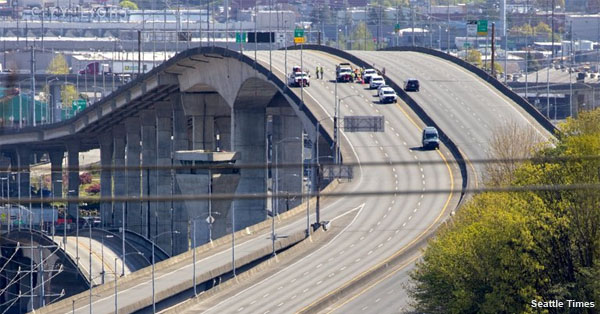
► In the Seattle Times — West Seattle Bridge will stay closed through 2020 and 2021 — And it’s not certain yet whether the bridge can even be saved. A two-year closure is sure to frustrate the 100,000 drivers and 25,000 transit riders each day who relied on the bridge, until the coronavirus outbreak dramatically cut traffic. Later this year when people presumably resume trips to jobs, schools and leisure activities, Seattle’s busiest city-owned bridge will not have recovered.
 ► From the NW Labor Press — New hands at helm of nurses union — The board of 15,000-member Oregon Nurses Association (ONA), an AFT affiliate, has selected a new executive director. Sarah Laslett comes to the union after 17 years as a labor educator, the last four at the University of Oregon’s Labor Education and Research Center and previously with the Washington State Labor Education and Research Center in Seattle.
► From the NW Labor Press — New hands at helm of nurses union — The board of 15,000-member Oregon Nurses Association (ONA), an AFT affiliate, has selected a new executive director. Sarah Laslett comes to the union after 17 years as a labor educator, the last four at the University of Oregon’s Labor Education and Research Center and previously with the Washington State Labor Education and Research Center in Seattle.
► The Joy of Life podcast — Larry Brown, president of the Washington State Labor Council, joins Peter Schrappen for an in-depth conversation about his tenure as head of WSLC as well as what he sees as the long-term impacts of COVID-19.
THAT WASHINGTON
► In the Milwaukee Journal Sentinel — Workers are getting sick and dying, but OSHA won’t crack down on businesses that fail to follow COVID-19 guidelines — As more of the nation’s essential workers become ill with coronavirus, the federal agency responsible for employee safety is telling many of them that it won’t crack down on businesses that fail to follow COVID-19 guidelines. The U.S. Occupational Safety and Health Administration’s position has left some workers, unions and advocates scrambling to figure out how to protect employees. “Workers are left to fend for themselves right now,” said Rebecca Reindel, safety and health director at the AFL-CIO.
► In the NY Times — Testing falls woefully short as Trump seeks an end to stay-at-home orders — As President Trump pushes to reopen the economy, most of the country is not conducting nearly enough testing to track the path and penetration of the coronavirus in a way that would allow Americans to safely return to work, public health officials and political leaders say. Flawed tests, scarce supplies and limited access to screening have hurt the U.S.’s ability to monitor COVID-19, governors and health officials warn.
► In the Washington Post — Trump’s attempt to enlist businesses in reopening push gets off to rocky start — Trump’s attempt to enlist corporate executives in a push to reopen parts of society amid the coronavirus pandemic got off to a rocky start Wednesday, with some business leaders complaining the effort was haphazard and warning that more testing needs to be in place before restrictions are lifted.
► In the NY Times — Trump’s ‘Opening Our Country Council’ runs into its own opening problems — Instead of a formal council, the president created several industry groups, and joined four calls with them. But some participants had no notice they would be included, and others could not join in… AFL-CIO President Richard Trumka was not asked whether he would join the group before his name was announced by Trump as a participant. But she said Trumka had planned to join a call with Trump on Wednesday “to see if it’s a serious effort.”
► From Politico — Stephen Miller’s hardline policies on refugee families make a comeback at HHS — While attention was on coronavirus, the White House quietly changed leaders in the office at the center of the family-separation firestorm.
► In the Washington Post — Trump denied he wanted his name on stimulus checks. Here’s how it happened.
NATIONAL
► From the Washington Post — U.S. now has 22 million unemployed, wiping out a decade of job gains — More than 22 million Americans have filed for unemployment aid since Trump declared a national emergency four weeks ago, a staggering loss of jobs that has wiped out a decade of employment gains and pushed families to line up at food banks as they await government help. Last week, 5.2 million people filed unemployment insurance claims. The United States has not seen this level of job loss since the Great Depression, and the government is struggling to respond fast enough.
► From The Guardian — ‘I can’t hug my kid’: how coronavirus is upending medical workers’ lives — Separating from family to avoid infecting them, sleeping in a car or a hotel, being treated like a ‘pariah’ are among the challenges facing health workers on the frontlines.
► From The Guardian — New York nurses hold vigil for colleagues who have died amid pandemic — Health workers march outside hospital in the Bronx and warn they remain without essential protective equipment.
► From Politico — New York nurses union to sue state health department, hospitals over equipment shortages
► In the Hawaii News Now — Unions plead with Hawaii governor to reconsider proposed pay cuts of up to 20% for state workers
► From The Guardian — Profit over people, cost over care: America’s broken healthcare exposed by virus — In the wealthiest country in the world, the COVID-19 pandemic has exposed the core of a healthcare system that is structurally incapable of dealing with the pandemic. Federal and local governments, health insurers and employers have pledged to help Americans pay their way through this crisis, but to do so requires a dramatic overhaul of a system which has for decades prioritized cost over care. There were 27.9 million people without health insurance in 2018 and that figure is projected to increase by millions because of record-high unemployment.
The Stand posts links to Washington state and national news of interest every weekday morning by 10 a.m.

